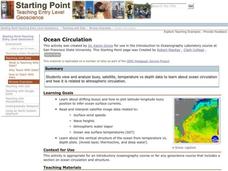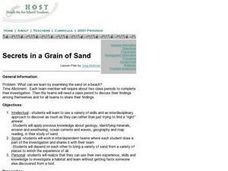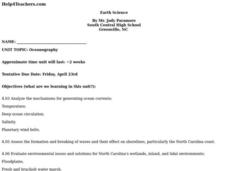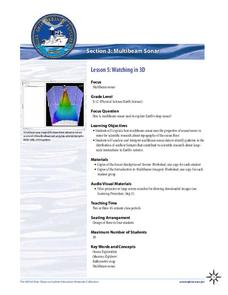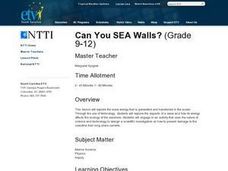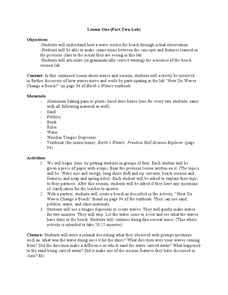Curated OER
Ocean Circulation
Students view and analyze buoy, satellite, temperature vs depth data to study about ocean circulation and how is related to atmospheric circulation. They read and interpret satellite image data related to: Surface wind speeds, Wave...
Curated OER
The Work of Waves and Wind
This is not revolutionary, but it is informative. Earth science viewers in grades 7-12 get carried away with wave and wind erosion. They view diagrams of how waves impact ocean shorelines. They see examples of the different types of sand...
Curated OER
Secrets in a Grain of Sand
Students working in small groups examine beach sand to discover signs of erosion, weathering, ocean currents and waves. They present their findings to the class.
STEM for Teachers
Tsunami!
How does the depth of an ocean affect the speed of a tsunami's waves? Use Jell-o, graham crackers, and marshmallows to model the effects of an underwater earthquake and its resulting tsunami. The lesson includes hands-on activities,...
Curated OER
Earth Science
Students analyze the mechanisms for generating ocean currents, temperature, and deep ocean circulation. They are able to assess the formation and breaking of waves and their effect on shorelines, particularly the North Carolina coast. ...
Curated OER
Science Jeopardy
Water, currents, waves, salt marshes, and The Chesapeake Bay make up the categories for this Jeopardy-style game. In terms of functionality, it works well. However, it is unlikely that you focus on the Chesapeake Bay as part of your...
Curated OER
The Great Ocean Conveyor
Students investigate water density. For this water density lesson, students conduct an experiment with food coloring, water and salt to see how the salt effects bodies of water.
Curated OER
Estuarine Currents
Students explore an estuarine system to gather data on density driven currents. This type of current is contrasted with temperature and wind driven currents.
Curated OER
Properties of the Ocean
Students participate in a problem-solving activity, that includes Internet research, about how energies such as currents, waves, tides, etc. affect the ocean.
Curated OER
NUMB3RS Activity: Riding the Waves
High schoolers use the TI-Navigator system to explore vector fields and make predictions. They also identify what a vector field is and that it represents the movement of water. Pupils try to determine where a bottle floating might have...
Curated OER
The Movement of Ocean Water-Science Puzzlers, Twisters & Teasers
In this earth science worksheet, students complete 19 questions about oceans and the movement of ocean water in the form of puzzles, word scrambles, and brain teasers.
NOAA
Watching in 3D
Bring the ocean floor to life! Earth science scholars discover the process of deep sea mapping in the third installment in a series of five lessons about ocean exploration. The teacher's guide includes helpful resources, worksheets, and...
PBS
Coastline Change
Continental drift happens over millions of years, but new perspective shows much faster changes. An informative resource offers a short term perspective using a series of satellite images. Viewers observe major changes to a coastline in...
Curated OER
Ocean Water and Life
In this ocean water and life worksheet, students match the vocabulary term with the correct definition. Also, students answer questions by deciding if the statements are true or false. Finally, students complete concepts maps while using...
Curated OER
Wave Erosion Lesson
Fourth graders examine the effects of waves as they erode coastal land. They discover how the power of water can change the appearance of land formations.
Curated OER
Marine Fisheries Management
Almost 200 slides make this a vast collection! It is a quirky collection, titled "Marine Fisheries Management," but having little to do with that occupation. What you will find are two-toned blue backgrounds with no pictures, but a few...
Curated OER
The Inside Current
Eighth graders explore ocean currents and wind patterns. They discover the concept of systems to show how change in one component of a body of water, causes change in other components in that system. Students describe positive and...
Curated OER
Ocean Shoreline
In this shorelines worksheet, students review some of the features of an ocean shoreline such as barrier islands, longshore current, and shoreline sediments. This worksheet has 5 matching and 4 short answer questions.
Curated OER
Coasts and Reefs: Shallow Marine Processes
A more thorough presentation on coastal systems would be difficult to find! Detailed diagrams illuminate the offshore, shoreface, foreshore, and backshore zones of beach. The sources and movement of sediments along the coastline are...
Curated OER
Ocean: Waves
In this ocean waves instructional activity, 6th graders read 2 pages about different types of ocean waves, then answer 10 true or false questions. An answer key is provided.
Curated OER
Oceanic Heat Budget Activities
Students map and research imaginary islands located in different parts of the world. They describe the weather and climate of their island and show how local currents, water temperatures and waves may influence the weather patterns.
Curated OER
Can You SEA Walls?
Learners explore how wave energy that is generated and transferred in the ocean. They explore the aspects of a wave and how its energy affects the ecology of the seashore. Students engage in an activity that uses the nature of science...
Curated OER
How Do Waves Change a Beach?
Young scholars conduct an experiment on beach erosion. In this earth science lesson, students create a beach model and use tongue depressor to produce waves. They write a journal about their observations.
Curated OER
Ride the Wave!
Students examine how sonar works. They discuss the concept of sound waves, observe a demonstration of how sonar works using water, pie plates, and eyedroppers, and describe how sonar works in their own words.


